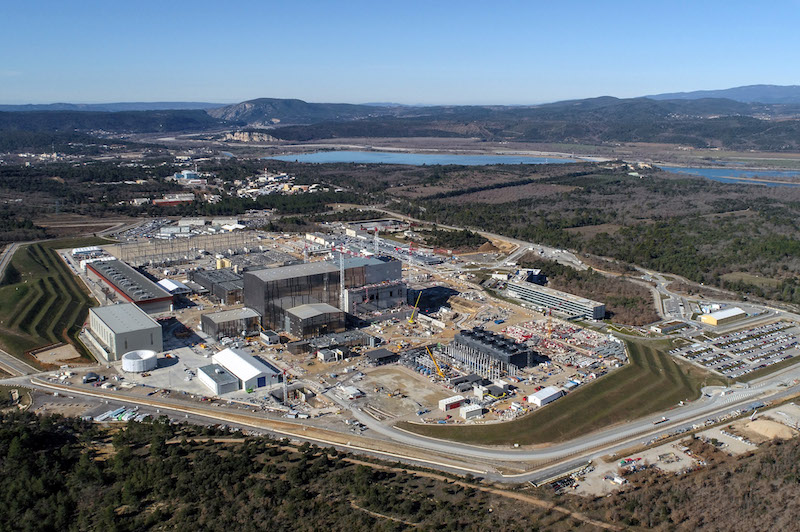At the ITER worksite, "Provence companies have a decisive advantage"

Interview with Bernard Bigot, Director General of Iter Organization.
ITER, an international program to build an experimental thermonuclear fusion reactor, is progressing by leaps and bounds, even during the pandemic: 75% of the civil engineering is complete and 78% of components have been manufactured and finalized. For Bernard Bigot, Director General of ITER Organization, it was vital to carry on despite the logistical complications caused by the closing of borders.
 Why did you choose to move forward with the ITER program in spite of the pandemic?
Why did you choose to move forward with the ITER program in spite of the pandemic?
Bernard Bigot: Back in December, our Chinese partners shut down their production. We had front row seats to the pandemic and were aware of the potential risks for the program's progress. We were careful to keep the best possible degree of continuity by maintaining "critical" activities which we could only suspend if we were willing to jeopardize the very future of the program. We planned in advance for social distancing measures and received masks generously supplied by our partners in China and South Korea. Our Italian employees, who were accustomed to spending the weekends with their families ‒ often in Lombardy ‒ agreed to give up those trips. The efforts paid off because we have not had any cases of COVID-19, among neither our employees nor those of our subcontractors.
In terms of team size, we dropped down to a low point in the first days of confinement: around 650 people compared to 3,800 under normal circumstances. The situation has evolved and now there are nearly 1,800 people on the site, about 100 of whom are in the offices.
Our subcontractors were grateful to us for having maintained this level of operation. There are 450 companies at the site, 80% of which are French. The vast majority of our 1,500 direct employees are working from home. This particularly difficult situation coincided with a densely packed delivery timeline. Thanks to everyone's commitment, we were able to take delivery on enormous parts weighing several hundred tons. It's fair to call it an ITER miracle.
However, with 35 countries involved, logistics must have been a huge challenge?
 Our purchasing and procurement teams dealt with a constantly changing situation as issues arose among suppliers in India, Italy, Spain and elsewhere. One example was the blocks needed to install the base of the cryostat, which is scheduled for the end of this month. The parts, which are made in India, were supposed to arrive just as the country closed its borders. We negotiated with the Indian government and received an exemption to have the seven-ton steel blocks carried by road, then shipped not by sea as originally planned, but by air because we needed them to install the cryostat base. Mind you, the plane cost an additional €20,000. But imagine the consequences if we had not been able to complete that step. The cost would not be measured in tens of thousands, but in millions of Euros.
Our purchasing and procurement teams dealt with a constantly changing situation as issues arose among suppliers in India, Italy, Spain and elsewhere. One example was the blocks needed to install the base of the cryostat, which is scheduled for the end of this month. The parts, which are made in India, were supposed to arrive just as the country closed its borders. We negotiated with the Indian government and received an exemption to have the seven-ton steel blocks carried by road, then shipped not by sea as originally planned, but by air because we needed them to install the cryostat base. Mind you, the plane cost an additional €20,000. But imagine the consequences if we had not been able to complete that step. The cost would not be measured in tens of thousands, but in millions of Euros.
More deliveries are in the works. In early July, we are expecting a 400-ton annular coil that measures 10 meters in diameter that departed Shanghai on May 6. Because of its size, we had to widen some of the passages along the last few kilometers of the ITER route between Fos and the site in Saint-Paul-lez-Durance.
Many companies in Provence see ITER as an engine to jump start the economic recovery. What are the opportunities in terms of potential contracts and requests for tender?
The RFPs to design the large components over periods of five or six years are closed. However, we will open other requests for proposals, which can be found on our website, to build new structures, such as the "hot cells" and the installation command post. Provence companies have a decisive advantage. They are already on site, unlike foreign companies which have to incur significant expense to send staff to Provence.
We have just received the latest statistics on ITER's economic impact. Their message is loud and clear. The total value of contracts awarded to prime contractors in Europe since 2007 is over €7 billion. Of that, nearly €4.5 billion, or 60%, has gone to French companies. And over €3 billion of that was awarded to companies in the Provence-Alpes-Côtes d'Azur region. Those figures do not even include the contracts signed between prime contractors and their subcontractors!



 +33 4 96 11 60 00
+33 4 96 11 60 00




